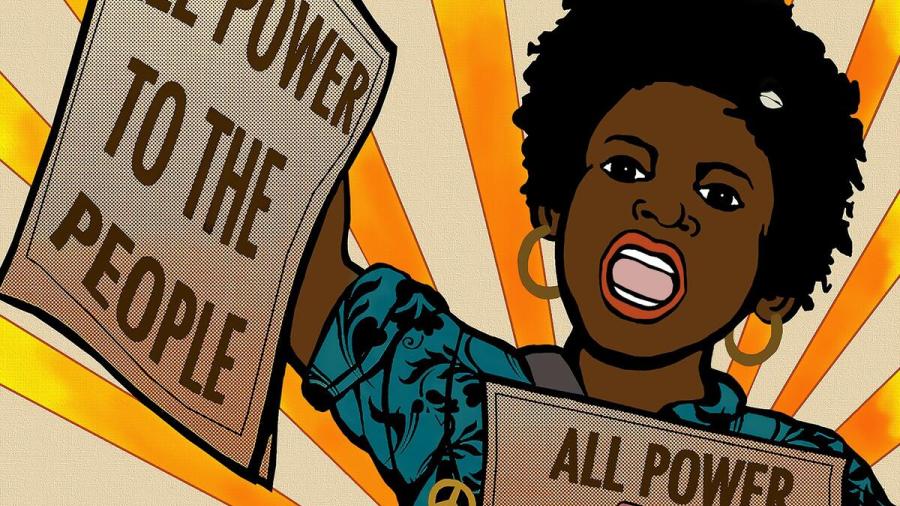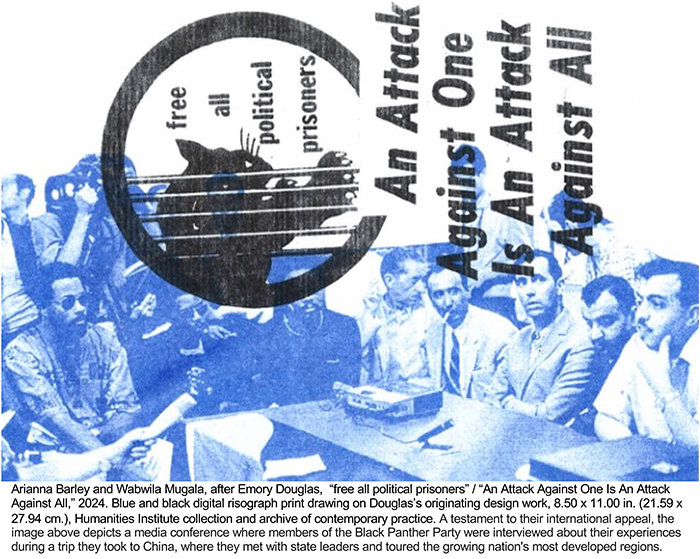
Critical Presence/Presents, the HI Blog
Leading Artist of the Black Arts Movement Visits the Humanities Institute

by Jacob Henry Leveton
Tempe, AZ / Feb. 28, 2024
“ALL POWER TO THE PEOPLE!” The refrain appears throughout the work of Emory Douglas, leading artist of the Black Arts Movement, who will visit the Humanities Institute for a lecture to conclude Black History Month.
From 1967 until 1982, Douglas served as Minister of Culture for the Black Panther Party, where he created a decisive visual language for black resistance, anti-colonial and anti-imperialist activism and universal human dignity. Since then, Douglas has continued to produce pivotal work as an artist and activist, giving voice to the place of art in struggle and survival. In recent years, Douglas has collaborated with The Black Lives Matter Global Network, Colin Kaepernick and participated in exhibitions at the Museum of Contemporary Art in Los Angeles, Tate Modern in London and the New Museum in New York, as well as in formal and informal spaces in Chiapas, Mexico, Lisbon, Portugal, New Zealand and Australia, where he collaborated with Richard Bell in Brisbane.
On Thursday, Feb. 29, at 5:30 p.m. Douglas will give an artist’s talk at Roskind Great Hall addressing the development, impact and future of his work in dialogue with Dr. Curtis Austin, the leading scholar of the history of the Black Panther Party. Austin serves as associate director of the Humanities Institute and associate professor of history in the School of Historical, Philosophical and Religious Studies and the School of Social Transformation, where he teaches courses on the Civil Rights and Black Power Movements.
Dr. Austin, speaking to the importance of this event, believes it is an important contribution to conversations for ASU and the Phoenix community. In an interview about the former Panther’s upcoming campus visit, Austin explained that “Douglas’s work is essential to understanding not only the sixties-era freedom struggle but also in seeing how art can encourage solidarity and transform the lives of those seeking to make positive social change.”
Amplifying Dr. Austin’s thinking, Humanities Director Ron Broglio said, “Hearing Emory Douglas speak and seeing his art brings the struggles of earlier generations to life and puts in context our own pursuits for justice.”
Douglas’s approach to political printmaking and newspaper design positioned the Panthers at the vanguard of emancipatory struggle worldwide, from Oakland to Algiers. Across the arc of its publication history, Douglas provided creative direction for The Black Panther, the party’s newspaper. The publication acted as an important engine for visualizing agency and circulating critical ideas regarding how to satisfy the full range of human need for social flourishing—freedom, education, full employment, universal housing, healthcare and an end to economic exploitation .
This will be an excellent opportunity for attendees to learn from one of the most significant figures in African American history and to understand the struggles and experiences of the Black Panther Party.
Register to be part of this conversation—one certainly not to be missed—here.
The Black Panthers: Curtis Austin on the Party in Celebration of Emory Douglas's Spring 2024 Visit
by Curtis Austin
Tempe, AZ / Feb. 25, 2024
Founded in October 1966 by college students Huey Newton and Bobby Seale, the Black Panther Party for Self-Defense was intended to address the myriad social and political needs of a segregated and marginalized Black community. Having created free food and clothing programs, free schools, and free medical centers, the Panthers also insisted that Black people had both a human and a constitutional right to defend themselves from external attack. The Party’s work in these matters made it one of the most effective organizations of the Civil Rights era. Its success in these areas of social change captured the imagination of not only American citizens but of freedom-loving people across the globe. By the mid-1970s, there were not only White Panthers inside the U.S. and abroad but Black Panther Party affiliates in Bermuda, Australia, New Zealand, England, India, Israel and a host of other nations. Attempting to combat racial oppression and to end economic exploitation of poor people, all these groups, including the original Party, encountered stiff resistance from the established order. This counter-revolutionary activity meant that some people like Fred Hampton of Chicago, was killed for his efforts to bring about positive social change, while scores of others, like Mumia Abu Jamal and Assata Shakur, were jailed. These individuals became political prisoners who were made to suffer the indignities of incarceration for decades. Many of these political prisoners, whose only crime had been to fight and organize to achieve liberty and justice for all, remain in jail today because they have refused to renounce their political views, many of which are widely acceptable among the public today. While the Black Panthers remained a national phenomenon with more than 40 chapters throughout the United States, its signature contribution to the Black Freedom Struggle remains its international outlook and its insistence that all the world’s peoples deserved food, clothing, housing, employment, justice and peace.
On Thursday, Feb 29, the Humanities Institute is pleased to welcome the critical contemporary creative practitioner Emory Douglas, Minister of Culture and official artist of the Black Panther Party, to Tempe for a reception, artist's talk and extraordinary dialogue with Curtis Austin, the leading Black Panther scholar and associate director of the Humanities Institute.
We invite you to join us for this reception in celebration of Douglas's visit to Tempe and the opportunity to meet the artist beginning at 4:30 p.m. at the Institute, followed immediately by the talk and dialogue at Roskind Great Hall, Armstrong 101.
